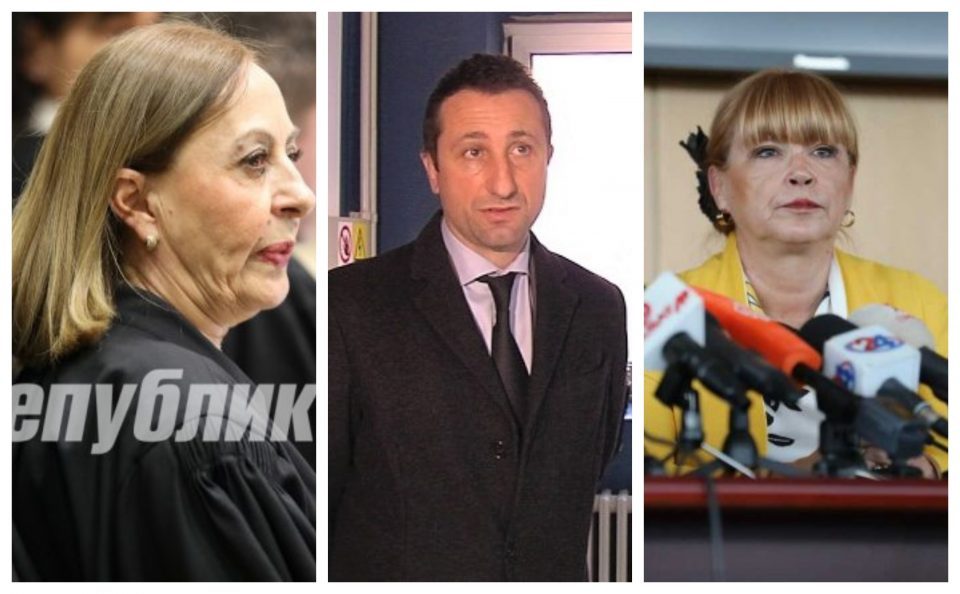The Kacarska judiciary is under the full control of the government and is used for political pressure against VMRO-DPMNE. Such accusations are constantly coming from VMRO-DPMNE, and the testimonies in the Racket case only add to the already existing suspicion that Judge Dobrila Kacarska is pressuring the judges and prosecutors in the Macedonian justice system.
She, as the VMRO-DPMNE accuses, works under the orders of former Prime Minister, Zoran Zaev. Macedonia is enslaved by the SDSM and the government-dependent judiciary, with many complaining of being suspected and charged in various court cases. VMRO-DPMNE has repeatedly pointed out that the Kacarska judiciary and the Ruskovska prosecution have no credibility and are an example of a criminal-violent prosecution and judiciary working under the current government of SDSM and Zaev.
What left the biggest impression last week are prosecutor Lile Stefanova’s claims that Dobrila Kacarska influenced decisions. She, through a colleague of the prosecutor, pressed not to order the detention of the suspect, Jordan Kamcev, in the “Empire” case and added that there was pressure from politicians as well.
It is true that Judge Dobrila Kacarska was in court all day and night when deciding on Kamcev’s detention, Stefanova said, when asked by the defense of defendant Bojan Jovanovski.
Stefanova made it clear to the court that Judge Dobrila Kacarska was among the emissaries in charge of interventions. In another country, Kacarska should be dismissed after such a statement, but in our country, Kacarska threatens to sue. She was disgusted by the statement of prosecutor Stefanova, and prosecutor Vilma Ruskoska also stood in her defense.
What further casts doubt on Kacarska’s involvement in the whole case is the fact that last week, during Stafanova’s testimony in the “Racket” case, Kacarska took sick leave and did not go to work for a whole week. And it is not surprising that Ruskoska defended Kacarska, as this is not the first time. One of the defendants in the case led by Judge Kacarska filed criminal charges against her for “Violation of citizens’ equality” of Article 137 paragraph 2 of the Criminal Code and the crime of “Torture and other cruel, inhuman or degrading treatment and punishment” of Article 142, paragraph 1 of the CC, but it was rejected by the prosecution. An appeal was also filed, but it was rejected by the public prosecutor.
What casts doubt on Kacarska’s relevance and influence over judges and prosecutors is the fact that Kacarska was informed of the existence of such criminal charges, though it is secret information. The persons who pressed the charges have never said about the existence of the criminal charges, and such information could only be provided by the Prosecution.
That she knows that there was a criminal charge against her, Kacarska stressed at a hearing before the Judicial Council where her dismissal was discussed. But no judgment was not passed…
After Stefanova accused Kacarska of exerting pressure for detentions in a case she was heading, Kacarska wrote to the Judges in the Judicial Council complaining that she suffered daily verbal attacks from defendants, their defenders as well as some politicians.
It goes so far that the judiciary is called by my surname “Kacarska judiciary”, she complained.
There were more complaints about Katsarska’s actions. One is the Ombudsman’s complaint on the April 27 case. The families of the defendants sought help from the Ombudsman. According to them, the judge made a gross violation of the procedure when she added detention to the guarantee although the defendants regularly appeared at the trials, none of them escaped, repeated or completed the crime, no final court decision was issued the convict may start serving his prison sentence.
This was referred to as an unintentional mistake by Judge Kacarska, who was not sanctioned at all. Was the unintentional mistake made because of the rush to comply with the orders given, then the families asked. In all the hurry with guarantees given, she puts people in detention even though these two measures cannot be pronounced together under the Criminal Procedure Code! The Ombudsman found that the rights of the defendants had been violated and made a public statement to the media and filed a complaint against Kacarska with the Judicial Council for initiating a procedure to establish her responsibility. Acting on this complaint, the Judicial Council instituted proceedings and found that the law had been violated by the Katsarska-led panel, but that it was an unintentional omission of the judge. And here it all ends.
Putting these omissions aside, Kacarska is still one of the most influential in the Macedonian judiciary. VMRO-DPMNE pointed out that after such testimony it is necessary to open a procedure, but so far nothing.
If “Racket” testimonies are correct, Kacarska should be held criminally responsible and behind bars. After all, no serious lawyer or prosecutor with many years of experience would testify falsely and know that they will be held responsible. Whether the allegations are true is up to the court to prove. Dobrila Kacarska no longer has the credibility to judge Macedonian citizens, said Dimce Arsovski, a VMRO-DPMNE spokesman.





Comments are closed for this post.